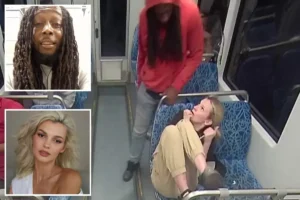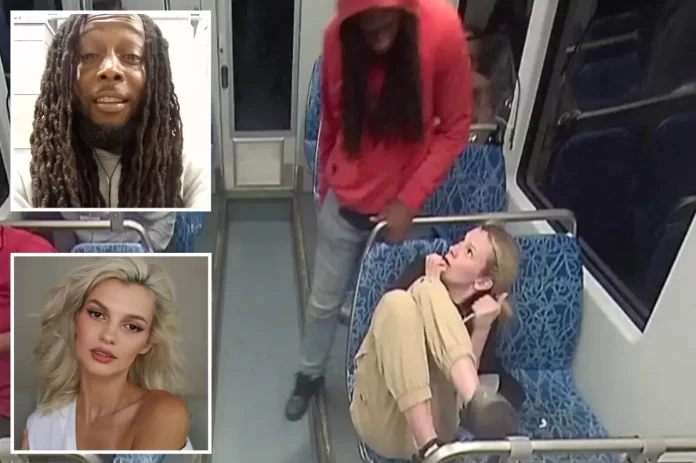SHOCKING DETAIL: While Cleaning the Room, Relatives Discovered a Polaroid Photo of Iryna Zarutska with Friends — But There Was a Shadowy Figure Standing Next to It That No One in the Group Noticed
In the ongoing saga of heartbreak surrounding the tragic death of 23-year-old Ukrainian refugee Iryna Zarutska, a chilling new revelation has surfaced that has left her family and friends reeling. As relatives sifted through her belongings while cleaning her room in their Huntersville home, they stumbled upon a faded Polaroid photo tucked away in a drawer. The snapshot captured a joyful moment from earlier that summer: Iryna beaming alongside a group of close friends at a local park picnic, their faces lit with laughter under the North Carolina sun. But upon closer inspection, a shadowy figure loomed in the background, partially obscured by a tree, standing unnervingly close to the group—yet no one in the photo, nor apparently anyone present at the time, had noticed its presence. This eerie discovery, shared exclusively with family confidants and now emerging in media reports, adds a layer of mystery and unease to the already devastating story of Zarutska's fatal stabbing on a Charlotte light rail train last month.

The photo, dated around mid-July 2025 based on the timestamp scribbled on the back in Iryna's handwriting, shows her in the center, her arm draped affectionately over her best friend Ulya's shoulder. The group—five young women in total, all Ukrainian immigrants who had bonded over shared experiences of displacement—posed casually on a checkered blanket, surrounded by half-eaten sandwiches and bottles of soda. Iryna, ever the artist, had adorned the edges of the Polaroid with small doodles of hearts and flowers, a testament to her creative spirit. But the figure in the shadows changes everything. Described by family members as a tall, indistinct silhouette wearing what appears to be a dark hoodie, it stands about 10 feet away, its posture rigid and watchful, as if observing the group without intent to join. The lack of clarity—blurred by the instant camera's limitations and the dappled sunlight filtering through the leaves—makes it impossible to identify, but its proximity sends shivers down the spines of those who have seen it.
Zarutska's aunt, Valeria Haskell, who helped discover the photo, recounted the moment in a tearful interview. “We were just trying to pack away her things, you know? It was hard enough going through her clothes and sketches, but finding this… it felt like a ghost from her past staring back at us.” The family had initially overlooked the figure when the photo was first developed and shared among friends, dismissing it as a trick of the light or a passerby. But now, in the wake of Iryna's murder on August 22, 2025, the image takes on a sinister connotation. “She escaped war in Ukraine, thinking America was safe,” Valeria added. “But what if this shadow was a sign? What if danger was following her even then?” The discovery has prompted the family to hand the photo over to Charlotte-Mecklenburg Police Department investigators, who are now analyzing it for any forensic clues, including potential fingerprints on the print or metadata from the camera.
To understand the profundity of this find, one must revisit Iryna's extraordinary journey. Born on May 22, 2002, in Kyiv, Ukraine, to parents Anna and Stanislav, Iryna grew up immersed in a world of art and family. She graduated from Synergy College with a degree in Art and Restoration, where her talents in sculpting and designing eclectic clothing shone brightly. A deep love for animals drove her aspirations to become a veterinary assistant, and she often volunteered walking neighbors' pets, her radiant smile lighting up the neighborhood. When Russia's full-scale invasion escalated in 2022, Iryna fled with her mother, younger sister Val, and brother Bohdan under the Uniting for Ukraine program. Her father stayed behind due to conscription laws, a separation that haunted her. Sponsored by her aunt Valeria and uncle Scott Haskell, the family settled in Huntersville, a quiet suburb north of Charlotte.
In the U.S., Iryna quickly embraced what her uncle called the “American dream.” Despite language barriers, she enrolled at Rowan-Cabarrus Community College to hone her English and pursued jobs to support her family. Starting as a housekeeper at a retirement community, she progressed to a sandwich shop and finally to line cook at Zepeddie’s Pizzeria in Charlotte's South End. Coworkers remember her as kind and hardworking, often sharing homemade Ukrainian borscht or piroshki during breaks. Her boyfriend, fellow Ukrainian immigrant Stanislav Nikulytsia, described their relationship as filled with simple joys: playing cards, swimming, and planning vacations. “She was saving for her first car,” he said. “She had just bought one and scheduled her driving test for October. She was so excited.” Friends echoed this, with Ulya posting tribute videos on Instagram showing Iryna dancing, mixing drinks, and hugging loved ones, captioned “#irynazarutska #foreveryoung #alwaysloved.”
That idyllic life shattered on August 22. After her shift, Iryna boarded the Charlotte Area Transit System (CATS) light rail around 9:46 p.m., still in her pizzeria uniform, scrolling on her phone. Surveillance footage captured the horror: 34-year-old Decarlos Dejuan Brown Jr., a homeless man with 14 prior arrests including armed robbery and mental health issues, approached from behind and stabbed her multiple times, slashing her throat. She collapsed, clutching her neck as blood pooled on the floor, while passengers froze or fled. Brown was arrested that night, charged with first-degree murder and a federal count for the act on mass transit, facing possible death penalty. The “gruesome” video's release ignited national fury, with figures like former President Donald Trump and Elon Musk decrying judicial leniency in Democrat-led areas. Charlotte Mayor Vi Lyles called it a “tragic failure,” promising more police on transit.

The Polaroid's shadowy figure has fueled speculation. Could it be Brown, stalking potential victims? Police have confirmed Brown frequented South End parks, but no direct link exists yet. Online, theories abound: some see it as a harbinger of the random violence that claimed Iryna's life, others as coincidence amplified by grief. “It's like the shadow of death was already there,” one friend posted on X. Family friend Lonnie told WCNC, “She left Ukraine to make her life better… and ends up murdered in the wrong place at the wrong time.” U.S. Attorney General Pam Bondi vowed federal prosecution, blaming “soft-on-crime policies.”
Amid the turmoil, Iryna's family clings to her memory. Her funeral drew over 100 attendees, with her father joining via FaceTime from Ukraine. They buried her in North Carolina, where she found fleeting peace. The train ticket returned by police—unfolded to reveal a smudged heart and “I love you, be safe” message—already symbolized lost innocence. Now, this Polaroid adds foreboding mystery. “Remember her smiling,” uncle Scott urges. As investigations probe the shadow, Iryna's story demands reflection on safety for refugees and the vulnerable. Her legacy: a call for justice, ensuring no shadowy threat claims another life.
